French Open, Paris
May 24, 1982; 128 Draw (16 seeded); Surface – Clay
The first major title for Mats Wilander, a Swedish teenager at the time, who hadn’t won a tournament prior to Roland Garros ’82, and it was his debut in Paris (a year before won the junior competition). En route to the title he outplayed four Top 10 guys in a row! The event was deprived of John McEnroe, No. 1 in the world at the time, and the defending champion Bjorn Borg, who won four previous events in Paris. The Swede decided to participate only in exhibition tournaments in 1982… Under these circumstances Ivan Lendl was a huge favorite to get his first major title.
The compilation prepared based on articles written for the New York Times
All scorelines
First round
Ivan Lendl took 1 hour 36 minutes today to get past the first round of the French Open tennis tournament, ousting Fernando Maynetto, a 26-year-old member of the Peruvian Davis Cup team, 6-0, 6-4, 6-1. Maynetto scored often with effective drop shots and managed to hold service three times before Lendl broke through and then outlasted him in some long games. Lendl is seeded second to Jimmy Connors, despite the expectations of many that Lendl will win here. Other seeded players who advanced were Vitas Gerulaitis, Brian Gottfried, Jose-Luis Clerc, Guillermo Vilas and Jose Higueras. Gerulaitis scored a 6-7, 6-3, 7-6, 6-3 triumph over Erik Iskersky, whom he beat in the first round of the Tournament of Champions at Forest Hills three weeks ago and again in the first round of the Italian Open last week. Jimmy Connors beat Bruce Manson, 6-3, 6-3, 6-1, today, and said afterward that the ankle injury that forced him to withdraw from a tournament in Hamburg, West Germany, earlier this month had given him no trouble in his first-round match at the $917,000 French Open. Connors, seeded first, dominated the 1-hour-46-minute match, although he had some trouble holding serve in the second set and went through a period during which many of his ground-strokes wound up in the net. ”The first match always takes a bit of feeling out,” he said. ”I started out well and then fluttered for about six or seven games, not really struggled, but just didn’t realize the right shots. But once I got that back I was fine.” Steve Denton became the first seeded player to be eliminated. Denton, No. 14, was upset by Danie Visser of South Africa, 3-6, 6-4, 7-6, 6-3. The seeded men who advanced were Eliot Teltscher, Yannick Noah, Mel Purcell, Peter McNamara, 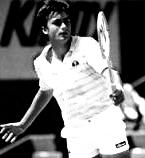 Balazs Taroczy and Chip Hooper. McNamara, a 26-year-old Australian, was given a good workout by Henri Leconte of France before prevailing, 4-6, 6-3, 7-6, 7-5. McNamara had to save 10 set points (!) to salvage the third set. Teltscher, seeded sixth, beat Nick Saviano, who like Teltscher is a resident of Florida, 6-4, 6-4, 6-3. Noah defeated a fellow Frenchman, Jean-Louis Haillet, 6-3, 6-3, 6-2. Purcell, from Murray, Ky., advanced with a 7-5, 6-2, 6-1 triumph over Guillermo Aubone, an Argentine who lives in Miami. Taroczy, a Hungarian who is seeded 10th, beat Hans Simonsson of Sweden, 4-6, 6-2, 6-7, 6-1, 6-4. Hooper, seeded 15th, beat David Carter of Australia, 6-0, 6-3, 6-0
Balazs Taroczy and Chip Hooper. McNamara, a 26-year-old Australian, was given a good workout by Henri Leconte of France before prevailing, 4-6, 6-3, 7-6, 7-5. McNamara had to save 10 set points (!) to salvage the third set. Teltscher, seeded sixth, beat Nick Saviano, who like Teltscher is a resident of Florida, 6-4, 6-4, 6-3. Noah defeated a fellow Frenchman, Jean-Louis Haillet, 6-3, 6-3, 6-2. Purcell, from Murray, Ky., advanced with a 7-5, 6-2, 6-1 triumph over Guillermo Aubone, an Argentine who lives in Miami. Taroczy, a Hungarian who is seeded 10th, beat Hans Simonsson of Sweden, 4-6, 6-2, 6-7, 6-1, 6-4. Hooper, seeded 15th, beat David Carter of Australia, 6-0, 6-3, 6-0
Andres Gomez of Ecuador, who won the Italian Open on Sunday and is seeded ninth here, was engaged in a thrilling match with Corrado Barrazzutti of Italy when the sun finally disappeared with the players tied in the fifth set. Gomez won the first two sets, 6-4, 6-4, then squandered three match points before losing the third-set tie-breaker. Barrazzutti won the fourth set 6-3, and the match ended with the two deadlocked in the final set, 3:3. After the resumption Gomaz took three straight games. Christophe Roger-Vasselin won absolutely amazing match against Marcos Hocevar 6-7, 3-6, 7-6, 7-6, 6-0. Roger-Vasselin saved three break points at 0:3 in the 3rd set, afterwards 9 match points in two consecutive sets before Hocevar succumbed.
Second round
Jose-Luis Clerc, seeded fourth among the men, had to save four match points at 3:5 in the 4th set (including a triple match point) against a French junior player before salvaging a second-round match 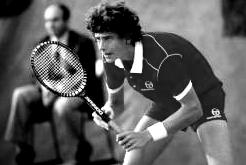 that lasted 4 hours 34 minutes. Clerc made numerous errors before he finally defeated Loic Courteau, 1-6, 7-5, 4-6, 7-6, 6-2. Courteau, 18 years old, entered the tournament as a wild-card player and was 352nd in the computer rankings. Courteau, the future coach of Amelie Mauresmo, led 4:1 in the 2nd set!
that lasted 4 hours 34 minutes. Clerc made numerous errors before he finally defeated Loic Courteau, 1-6, 7-5, 4-6, 7-6, 6-2. Courteau, 18 years old, entered the tournament as a wild-card player and was 352nd in the computer rankings. Courteau, the future coach of Amelie Mauresmo, led 4:1 in the 2nd set!
In the second round, Ivan Lendl completed a 7-6, 7-5, 7-6 triumph over Thierry Tulasne by sweeping the first seven points of a tiebreaker. The match had been suspended twice, first at dusk Wednesday at 3:3 in the third set, and again today because of an hour of rain. [A couple weeks later Lendl and Tulasne played a tight match again, in the Davis Cup quarterfinal, and Lendl prevailed 6-3, 4-6, 6-3, 9-11, 6-4…] The best junior in the world, 17-year-old Guy Forget, playing with bushy hair (a couple years later became bald) his just second main-level tournament, stunned 19 years older Ilie Nastase, a former champion of the French Open, 6-1, 5-7, 6-4, 1-6, 9-7.
Third round
 Dressed in red from shoulder to thighs, Chip Hooper looked like a basketball player making a dunk as he raised his racquet above his 6-foot-6-inch (198 cm) body, jumped high off the red clay and unleashed a booming smash. The smash was among his arsenal of weapons in a 6-3, 6-4, 6-7, 7-6 victory in the French Open over Jimmy Arias, the 5-8 teen-ager (173 cm) with whom he often practices. The two Americans, products of Nick Bollettieri’s tennis camp in Bradenton, Fla., were playing for a chance to meet Jimmy Connors in the round of 16. ”That would have been a dream,” said Arias, who won the mixed doubles title here last year with Andrea Jaeger. Hooper, despite squandering two match points in the third set, spoiled Arias’s dream with persistent intimidation. Bollettieri, who was in the stands, said: ”Chip’s ground strokes are so deep that Jimmy was trying to hit winners from the base line.” The upshot has been a tremendous improvement in Hooper’s world ranking. He started the year at No.235, and was as high as 17 before falling back to his present 27. [Looking at Hooper’s activity in ’82 it’s tough to understand how he could make such a big progress with his results, it was a time when there were fewer players than nowadays and a tremendous jump in the ATP ranking was easier to achieve; anyway it was Hooper’s only advancement to the last 16 in majors...] His game is suited more for fast courts, such as the grass at Wimbledon, than the slow clay at Roland Garros Stadium. ”We sort of had to talk him into coming into the French,” Bollettieri said. ”He tends to relax on clay. But I told him, ‘If you’re good, you should play on everything.” Jimmy Connors, meanwhile, had some trouble with Guy Forget, a 17-year-old Frenchman who had beaten Ilie Nastase. Forget became the first player to win a set from Connors in the tournament as he bowed in a two and-a-half-hour struggle, 6-2, 6-3, 6-7, 6-1.
Dressed in red from shoulder to thighs, Chip Hooper looked like a basketball player making a dunk as he raised his racquet above his 6-foot-6-inch (198 cm) body, jumped high off the red clay and unleashed a booming smash. The smash was among his arsenal of weapons in a 6-3, 6-4, 6-7, 7-6 victory in the French Open over Jimmy Arias, the 5-8 teen-ager (173 cm) with whom he often practices. The two Americans, products of Nick Bollettieri’s tennis camp in Bradenton, Fla., were playing for a chance to meet Jimmy Connors in the round of 16. ”That would have been a dream,” said Arias, who won the mixed doubles title here last year with Andrea Jaeger. Hooper, despite squandering two match points in the third set, spoiled Arias’s dream with persistent intimidation. Bollettieri, who was in the stands, said: ”Chip’s ground strokes are so deep that Jimmy was trying to hit winners from the base line.” The upshot has been a tremendous improvement in Hooper’s world ranking. He started the year at No.235, and was as high as 17 before falling back to his present 27. [Looking at Hooper’s activity in ’82 it’s tough to understand how he could make such a big progress with his results, it was a time when there were fewer players than nowadays and a tremendous jump in the ATP ranking was easier to achieve; anyway it was Hooper’s only advancement to the last 16 in majors...] His game is suited more for fast courts, such as the grass at Wimbledon, than the slow clay at Roland Garros Stadium. ”We sort of had to talk him into coming into the French,” Bollettieri said. ”He tends to relax on clay. But I told him, ‘If you’re good, you should play on everything.” Jimmy Connors, meanwhile, had some trouble with Guy Forget, a 17-year-old Frenchman who had beaten Ilie Nastase. Forget became the first player to win a set from Connors in the tournament as he bowed in a two and-a-half-hour struggle, 6-2, 6-3, 6-7, 6-1.
Fourth round
Mats Wilander, a 17-year-old Swede with a steady baseline game, eliminated Ivan Lendl from the French Open tennis tournament today by winning, 4-6, 7-5, 3-6, 6-4, 6-2, in a four-hour struggle and moving into the quarterfinals. Lendl led 5:4 (30/0) in the 2nd set. The victory was astonishing because Lendl, who reached the final here last year, had won 92 of his previous 95 matches and was seeded second in this tournament. ‘‘I just wasn’t hitting the 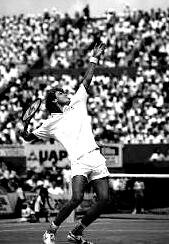 ball,” Lendl explained later. ”My timing was off, especially in my forehand. That’s why he was outplaying me from the baseline. I can’t do much without my forehand.” It was the first five-set match Wilander had ever played. He next meets Vitas Gerulaitis, who advanced with a 6-3, 6-3, 6-2 victory over Mel Purcell. Wilander, who last year won the French juniors title, met Gerulaitis in the final at Brussels earlier this year, with Gerulaitis winning in three sets. Wilander continued to draw attention through the spring by defeating Andres Gomez in Milan, Jose Higueras in Dusseldorf, West Germany, and Tomas Smid in Rome, where he lost to Gomez in the semifinals. He came to Paris ranked 18th by the Association of Tennis Professionals. Today, Lendl tried to compensate for his dead forehand by attacking at the net. But Wilander did a good job at keeping his opponent at bay. ”He was playing very deep and I didn’t have as many chances to come in as I would have liked,” Lendl said. Lendl cited Wilander’s backhand down the line as the youngster’s best shot. Another asset was Wilander’s apparent ability to remain cool under the pressure. In the final set, Wilander quickly jumped ahead, 4:0. When Lendl netted a forehand on the second match point, Wilander showed no emotion and simply walked to the net to shake hands. Wilander is repeatedly asked to compare himself with his renowned fellow Swede, Bjorn Borg. Wilander replies that Borg’s stature makes any such comparison ridiculous, but adds that, “I started with the two-handed backhand before Borg was famous.” Lendl today said of Wilander: ”One match doesn’t make a champion.” In contrast to the Lendl-Wilander match, in which many of the points were won after lengthy rallies, the match between Purcell and Gerulaitis was a duel of speed and agility. Many of the points were short and quick. Gerulaitis played what might have been his best game ever on clay, making few mistakes and volleying with precision. His backhand volley was especially effective against Purcell. When someone reminded Gerulaitis of his humiliation here two years ago, when he lost the final to Borg, 6-4, 6-1, 6-2, Gerulaitis replied: ”Yeah, if I could have played on clay then like I am now, I would have won a set.” Peter McNamara, a runner-up in three tournaments this year, needed only a few minutes to put out Andres Gomez, 6-1, 5-7, 6-3, 3-6, 11-9 (the match lasted 3 hours 31 minutes). The two, who have been strong attractions in the tournament, played Sunday night for as long as they could see, then resumed today at 9:9 in the fifth set. McNamara saved two match
ball,” Lendl explained later. ”My timing was off, especially in my forehand. That’s why he was outplaying me from the baseline. I can’t do much without my forehand.” It was the first five-set match Wilander had ever played. He next meets Vitas Gerulaitis, who advanced with a 6-3, 6-3, 6-2 victory over Mel Purcell. Wilander, who last year won the French juniors title, met Gerulaitis in the final at Brussels earlier this year, with Gerulaitis winning in three sets. Wilander continued to draw attention through the spring by defeating Andres Gomez in Milan, Jose Higueras in Dusseldorf, West Germany, and Tomas Smid in Rome, where he lost to Gomez in the semifinals. He came to Paris ranked 18th by the Association of Tennis Professionals. Today, Lendl tried to compensate for his dead forehand by attacking at the net. But Wilander did a good job at keeping his opponent at bay. ”He was playing very deep and I didn’t have as many chances to come in as I would have liked,” Lendl said. Lendl cited Wilander’s backhand down the line as the youngster’s best shot. Another asset was Wilander’s apparent ability to remain cool under the pressure. In the final set, Wilander quickly jumped ahead, 4:0. When Lendl netted a forehand on the second match point, Wilander showed no emotion and simply walked to the net to shake hands. Wilander is repeatedly asked to compare himself with his renowned fellow Swede, Bjorn Borg. Wilander replies that Borg’s stature makes any such comparison ridiculous, but adds that, “I started with the two-handed backhand before Borg was famous.” Lendl today said of Wilander: ”One match doesn’t make a champion.” In contrast to the Lendl-Wilander match, in which many of the points were won after lengthy rallies, the match between Purcell and Gerulaitis was a duel of speed and agility. Many of the points were short and quick. Gerulaitis played what might have been his best game ever on clay, making few mistakes and volleying with precision. His backhand volley was especially effective against Purcell. When someone reminded Gerulaitis of his humiliation here two years ago, when he lost the final to Borg, 6-4, 6-1, 6-2, Gerulaitis replied: ”Yeah, if I could have played on clay then like I am now, I would have won a set.” Peter McNamara, a runner-up in three tournaments this year, needed only a few minutes to put out Andres Gomez, 6-1, 5-7, 6-3, 3-6, 11-9 (the match lasted 3 hours 31 minutes). The two, who have been strong attractions in the tournament, played Sunday night for as long as they could see, then resumed today at 9:9 in the fifth set. McNamara saved two match  points in the 5th set, then couldn’t finish the contest serving at 8:7 and 9:8. McNamara with several doubles titles, and Gomez, an Ecuadorean with one of the fiercest forehands, have a sense of showmanship. Their matches, before they met, had provided lively contrasts to the general run of dreary baseline duels. “I think I have the game that people like to watch,” said Gomez, who lost to McNamara earlier this month in Hamburg (5-7, 1-6, 2-6; it were their only matches). ”It’s important to win, but it’s also important to put on a good show.”
points in the 5th set, then couldn’t finish the contest serving at 8:7 and 9:8. McNamara with several doubles titles, and Gomez, an Ecuadorean with one of the fiercest forehands, have a sense of showmanship. Their matches, before they met, had provided lively contrasts to the general run of dreary baseline duels. “I think I have the game that people like to watch,” said Gomez, who lost to McNamara earlier this month in Hamburg (5-7, 1-6, 2-6; it were their only matches). ”It’s important to win, but it’s also important to put on a good show.”
His show with McNamara was good enough to keep thousands of spectators in the center-court stadium until the end Sunday night. Guillermo Vilas has progressed through the tournament without serious challenge. His latest victim was Andreas Maurer of West Germany, 6-2, 6-3, 6-1. But Maurer was the only player to take three games of a set from the Argentine. Higueras, who beat McNamara to win the Hamburg event, defeated Eliot Teltscher, 6-4, 6-2, 6-0. Teltscher, a high-ranking American and normally a sound ground-stroker, was far off form. Jimmy Connors ended the hopes of Chip Hooper, 6-1, 6-0, 6-4. He said he had expected a longer match with the 6-foot-6-inch power hitter, to whom he lost a set at the United States Pro indoor last January in Philadelphia. Yannick Noah needed 4 hours 41 minutes to outlast Wojtek Fibak 4-6, 6-7, 6-4, 6-4, 6-3 on Centre Court.
Quarterfinals
Mats Wilander made a case for fundamentals over finesse today when he upset Vitas Gerulaitis, 6-3, 6-3, 4-6, 6-4, and reached the semifinals of the French Open tennis tournament. Wilander’s opponent will be Jose-Luis Clerc, seeded third, who beat Peter McNamara, 6-2, 6-2, 6-1. Wilander, the 17-year-old Swede who had upset Ivan Lendl, used his steady baseline game in proving that the first rule of tennis is to get the ball back. Gerulaitis, seeded fifth, played his usual aggressive game, serving and volleying well. He was beaten largely because of Wilander’s ability to make the passing shot. “I played the percentages but it didn’t work,” said Gerulaitis, who beat Wilander earlier this year in Brussels. ”He played about the same today, but the clay court helped him.” Gerulaitis said he was particularly impressed by Wilander’s two-handed backhand. ”The way he rallies with it shows it’s a little more flexible than his forehand,” he said. In Gerulaitis, ranked ninth in the world, Wilander had an opponent who differed from Lendl in that he did not stay back. ”If my passing shots had not worked, it would have been difficult,” said Wilander. Jose Higueras, a 29-year-old  Spaniard whose bout with hepatitis two years ago made him concerned about his future in tennis, left little doubt about his recovery today as he posted a 6-2, 6-2, 6-2 victory over top-seeded Jimmy Connors. Higueras advanced to Friday’s semifinals against Guillermo Vilas of Argentina, who defeated Yannick Noah of France, 7-6, 6-3, 6-4. Vilas took a revenge for a 4-set loss to Noah a year before (in the fourth round). It was their third match on Centre Court in Paris overall, the first one occurred in 1978. Higueras, who is seeded 14th, demonstrated the classical clay-court game that won him renown in 1979, when he broke into the world’s top 10. He refused to let Connors lure him to the net, disdaining the approach shot and staying on the baseline. Connors gave up trying to volley, because Higueras was beating him with blazing passes. Also, the American’s forehand was erratic, and Higueras kept pounding the ball to that side. The tactic worked, as Connors, forcing the pace, hit many balls into the net. ”I’m in very good condition,” said Higueras, who won a five-hour final in Hamburg last month (he beat McNamara 7-6 in the fifth set – it was the longest final through the next 23 years!). ”I’ve played a lot of matches lately.” The lopsided score betrayed the amount of work done on the court. ”I didn’t think it was an easy match at all,” said Higueras, who beat Connors last year at North Conway, N.H. ”I was running a lot.” ”We were close in a lot of games,” said Connors. ”I just couldn’t put two or three points together. I wasn’t hitting the ball badly, but he didn’t miss many.”
Spaniard whose bout with hepatitis two years ago made him concerned about his future in tennis, left little doubt about his recovery today as he posted a 6-2, 6-2, 6-2 victory over top-seeded Jimmy Connors. Higueras advanced to Friday’s semifinals against Guillermo Vilas of Argentina, who defeated Yannick Noah of France, 7-6, 6-3, 6-4. Vilas took a revenge for a 4-set loss to Noah a year before (in the fourth round). It was their third match on Centre Court in Paris overall, the first one occurred in 1978. Higueras, who is seeded 14th, demonstrated the classical clay-court game that won him renown in 1979, when he broke into the world’s top 10. He refused to let Connors lure him to the net, disdaining the approach shot and staying on the baseline. Connors gave up trying to volley, because Higueras was beating him with blazing passes. Also, the American’s forehand was erratic, and Higueras kept pounding the ball to that side. The tactic worked, as Connors, forcing the pace, hit many balls into the net. ”I’m in very good condition,” said Higueras, who won a five-hour final in Hamburg last month (he beat McNamara 7-6 in the fifth set – it was the longest final through the next 23 years!). ”I’ve played a lot of matches lately.” The lopsided score betrayed the amount of work done on the court. ”I didn’t think it was an easy match at all,” said Higueras, who beat Connors last year at North Conway, N.H. ”I was running a lot.” ”We were close in a lot of games,” said Connors. ”I just couldn’t put two or three points together. I wasn’t hitting the ball badly, but he didn’t miss many.”
Semifinals
Jose-Luis Clerc‘s forehand was called long by the linesman today, and the fans at Roland Garros Stadium began to cheer Mats Wilander’s third upset in the French Open tennis tournament. But the semifinal match was not over yet. Instead of going to the net to receive the congratulatory handshake, the 17-year-old Wilander stood in the back-court shaking his head. The umpire, Jacques Dorfman, had already descended from his chair and was ignoring Clerc’s strenuous protest over the call. But Wilander walked over to the umpire and said a few words. Then the players returned to their positions to replay the point. Clerc sent a backhand into the net, and Wilander had won cleanly, 7-5, 6-2, 1-6, 7-5 after 3 hours 42 minutes. The young Swede, the sensation of the tournament, plays for the championship Sunday against Guillermo Vilas, who defeated Jose Higueras, after 2 hours 40 minutes, 6-1, 6-3, 7-6(3). About his conversation with the umpire, Wilander said: ”I told him I can’t win like this. The ball was good. We should play two balls.” [It was a time when chair umpires didn’t bother to check the mark…] A member of the Swedish Davis Cup team, 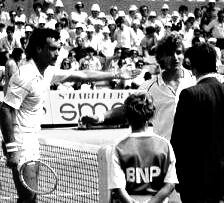 with a Bjorn Borg-like coolness, Wilander has defeated three top-10 players, including Ivan Lendl and Vitas Gerulaitis. He opened the match with a service break, then played near-flawless tennis. Clerc, a base-line player like Wilander, had to change tactics and go to the net in an effort to break his opponent’s rhythm. The hallmark of Wilander’s game throughout the tournament has been his consistency in returning every type of shot. Indicative of that consistency were the ways he won the first two sets. At set point in the first set, he waited patiently through 48 exchanges, until Clerc hit a forehand long. To reach set point in the second set, he got back three smashes on the slow clay and was prepared to send back a fourth, but Clerc dumped the ball into the net. Wilander then won the point with a crisp cross-court forehand volley. Clerc, who won six titles last year and one this spring, mixed his game from the start. But until the third set, his unfamiliarity with the forecourt resulted in many missed smashes and errant volleys. Wilander rebounded in the fourth set and was quickly ahead, 5:1, but squandered a match point when he sent a forehand wide. Of the 17 subsequent points, he was able to win only 2, and suddenly the score was 5:5. ‘‘I wasn’t nervous but I thought he was going to win the fourth set,” he said later. But Clerc made four consecutive unforced errors to give Wilander the 11th game at love. Moments later, the third-seeded Clerc was serving at 30/40. Then Wilander made the sporting gesture. Dorfman said he was convinced that the ball had been out, but he allowed the point to be replayed, he said, because both players agreed to it. But he added: “In all my experience, I have never known a gesture of sportsmanship like that on a match point.” It was not the first time Wilander had given back a match point. He did it before, he said, in a junior tournament in Italy. The final presents a good contrast. Wilander could become the youngest player ever to win the men’s title. Borg, a countryman, was 18 when he won in 1974. Wilander will not be 18 until Aug. 22. Vilas, 30, won in 1977 and was runner-up in 1975 and 1978. Vilas, who has won five tournaments this year, has seldom played better than now. His repertory is bigger and his style more aggressive than Wilander’s. No longer can he be considered strictly a base-line player. He beat Wilander earlier this year in Madrid (6-3, 6-4), and has not lost a set in this tournament. Against Higueras, he faced a rejuvenated clay expert who had eliminated Jimmy Connors. But it was another routine victory for Vilas, although he did lose some concentration when serving for the match at 5:4 in the third set.
with a Bjorn Borg-like coolness, Wilander has defeated three top-10 players, including Ivan Lendl and Vitas Gerulaitis. He opened the match with a service break, then played near-flawless tennis. Clerc, a base-line player like Wilander, had to change tactics and go to the net in an effort to break his opponent’s rhythm. The hallmark of Wilander’s game throughout the tournament has been his consistency in returning every type of shot. Indicative of that consistency were the ways he won the first two sets. At set point in the first set, he waited patiently through 48 exchanges, until Clerc hit a forehand long. To reach set point in the second set, he got back three smashes on the slow clay and was prepared to send back a fourth, but Clerc dumped the ball into the net. Wilander then won the point with a crisp cross-court forehand volley. Clerc, who won six titles last year and one this spring, mixed his game from the start. But until the third set, his unfamiliarity with the forecourt resulted in many missed smashes and errant volleys. Wilander rebounded in the fourth set and was quickly ahead, 5:1, but squandered a match point when he sent a forehand wide. Of the 17 subsequent points, he was able to win only 2, and suddenly the score was 5:5. ‘‘I wasn’t nervous but I thought he was going to win the fourth set,” he said later. But Clerc made four consecutive unforced errors to give Wilander the 11th game at love. Moments later, the third-seeded Clerc was serving at 30/40. Then Wilander made the sporting gesture. Dorfman said he was convinced that the ball had been out, but he allowed the point to be replayed, he said, because both players agreed to it. But he added: “In all my experience, I have never known a gesture of sportsmanship like that on a match point.” It was not the first time Wilander had given back a match point. He did it before, he said, in a junior tournament in Italy. The final presents a good contrast. Wilander could become the youngest player ever to win the men’s title. Borg, a countryman, was 18 when he won in 1974. Wilander will not be 18 until Aug. 22. Vilas, 30, won in 1977 and was runner-up in 1975 and 1978. Vilas, who has won five tournaments this year, has seldom played better than now. His repertory is bigger and his style more aggressive than Wilander’s. No longer can he be considered strictly a base-line player. He beat Wilander earlier this year in Madrid (6-3, 6-4), and has not lost a set in this tournament. Against Higueras, he faced a rejuvenated clay expert who had eliminated Jimmy Connors. But it was another routine victory for Vilas, although he did lose some concentration when serving for the match at 5:4 in the third set.
Final
With cracks of thunder accenting the most dramatic moments, Mats Wilander completed a memorable performance in the French Open tennis championships today by emerging as the youngest player ever to win the men’s title. The 17-year-old Swede defeated Guillermo Vilas, 1-6, 7-6(6), 6-0, 6-4, in a match that went 4 hours 42 minutes on the slow clay. The time was five minutes longer than the previous record for a final set in 1929, when Rene Lacoste beat Jean Borotra (6-3, 2-6, 6-0, 2-6, 8-6… both players visible in the picture, behind Vilas). Simultaneously it was the longest match at the Roland Garros at the time, the record was surpassed 8 years later by Haarhuis and Pugh. Wilander, ranked 18th in his first full year as a professional, received $66,000. He beat four players in the world’s top 10 – Vilas, Ivan Lendl, Vitas Gerulaitis and Jose-Luis Clerc. The temperature on center court was 96 degrees (36 Celsius) when the men’s final started. Wilander, suffering from a cold, kept his poise after an embarrassing first set, and turned the match to his favor by winning the second-set tiebreaker, 8 points to 6. With long exchanges, the match became a test of nerves and patience. The pace was set in the first game, which lasted seven minutes. Eight of the first 9 points were decided on unforced errors. After 17 minutes of play, Vilas made the first venture to the net, scoring with a volley. The fourth game lasted 18 minutes, going to deuce six times. Vilas won it for a 4:0 lead. Wilander needed only the next three minutes to take his first game, getting all his points on unforced errors. But Vilas clinched the set soon afterward with a forehand cross-court winner on the line. ”I thought that this is what the match would end like, 6-1, 6-1, 6-1,” Wilander said later. “I thought I didn’t have a chance. He was playing so well.” Then he got a lucky break, winning the first game of the second set with a net-cord shot that flew beyond Vilas’s reach. Both players were showing a little less caution now, which might have contributed to the six consecutive service breaks that followed. Vilas broke the pattern 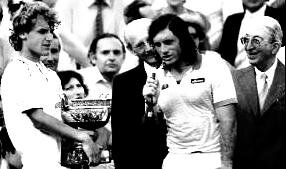 when he served to pull even, 4:4. Both then held serve to force the tiebreaker. Wilander took the first 2 points, and Vilas the next 3. Then each player made a mistake before Wilander scored with a lob when Vilas thought he had made a winning volley. The score was now 4:4, with the sun not in sight and the thunder booming. Wilander sent a forehand wide, but Vilas double-faulted. When Vilas scored on a smash, he was at set point on Wilander’s serve. But the Argentine drove a forehand barely long. ”If that shot had stayed in, I wouldn’t have had a chance,” Wilander said. With a second chance, the youngster drew even and then went ahead, 7:6, with a perfect lob. He hit another towering lob, for which Vilas got into position for a smash. But he clubbed the ball straight into the net and thus surrendered his first set since the $917,000 tournament began two weeks ago. Wilander broke serve to open the third set and, typically, all 10 points of the game were scored on unforced errors. Neither player was ready yet to resume taking chances. The potential storm had blown over now, and the sun was again baking the clay. Vilas’s frustration at having lost the tiebreaker became evident. He won only 12 points in the set, giving it up when the score reached 4:0. ”He hits a very slow ball,” Vilas said afterward. ”It takes a lot of time to come down, and he always has time to get back into position. I didn’t know how to deal with that.” The Argentine began the fourth set with renewed determination, breaking to 2:0, although the baseline attrition continued. Then Wilander became more aggressive, taking the ball on the rise and pounding shots to the corners. especially with his two-handed backhand. He got back to 2:2, then, with Vilas serving, they engaged in a rally that might have been the record for the match. There were about 80 exchanges before Wilander unloaded another backhand winner. Vilas, however, took the game, but Wilander broke back in the seventh and ninth games. Serving for the match, he went to 40/0, then squandered one match point when his backhand sailed long. Then he snapped a backhand cross-court winner for the victory. Bjorn Borg, Wilander’s countryman, had been the youngest French men’s champion at 18. Wilander turns 18 on Aug. 22. Asked how it felt to be the youngest champion, he replied in his usual soft voice: ”It really doesn’t matter to me being the youngest. It’s just important for me to win.” Vilas said: ”You fight for a title and sometimes you win and sometimes you lose. I won in 1977. But he played better. I don’t have any complaints.” This extraordinary match remained the longest 4-setter through the next 24 years (!) until an encounter between Nadal and Mathieu at the French Open ’06. Wilander became the first unseeded Roland Garros champion since 1947 when had triumphed Joszef Asboth of Hungary.
when he served to pull even, 4:4. Both then held serve to force the tiebreaker. Wilander took the first 2 points, and Vilas the next 3. Then each player made a mistake before Wilander scored with a lob when Vilas thought he had made a winning volley. The score was now 4:4, with the sun not in sight and the thunder booming. Wilander sent a forehand wide, but Vilas double-faulted. When Vilas scored on a smash, he was at set point on Wilander’s serve. But the Argentine drove a forehand barely long. ”If that shot had stayed in, I wouldn’t have had a chance,” Wilander said. With a second chance, the youngster drew even and then went ahead, 7:6, with a perfect lob. He hit another towering lob, for which Vilas got into position for a smash. But he clubbed the ball straight into the net and thus surrendered his first set since the $917,000 tournament began two weeks ago. Wilander broke serve to open the third set and, typically, all 10 points of the game were scored on unforced errors. Neither player was ready yet to resume taking chances. The potential storm had blown over now, and the sun was again baking the clay. Vilas’s frustration at having lost the tiebreaker became evident. He won only 12 points in the set, giving it up when the score reached 4:0. ”He hits a very slow ball,” Vilas said afterward. ”It takes a lot of time to come down, and he always has time to get back into position. I didn’t know how to deal with that.” The Argentine began the fourth set with renewed determination, breaking to 2:0, although the baseline attrition continued. Then Wilander became more aggressive, taking the ball on the rise and pounding shots to the corners. especially with his two-handed backhand. He got back to 2:2, then, with Vilas serving, they engaged in a rally that might have been the record for the match. There were about 80 exchanges before Wilander unloaded another backhand winner. Vilas, however, took the game, but Wilander broke back in the seventh and ninth games. Serving for the match, he went to 40/0, then squandered one match point when his backhand sailed long. Then he snapped a backhand cross-court winner for the victory. Bjorn Borg, Wilander’s countryman, had been the youngest French men’s champion at 18. Wilander turns 18 on Aug. 22. Asked how it felt to be the youngest champion, he replied in his usual soft voice: ”It really doesn’t matter to me being the youngest. It’s just important for me to win.” Vilas said: ”You fight for a title and sometimes you win and sometimes you lose. I won in 1977. But he played better. I don’t have any complaints.” This extraordinary match remained the longest 4-setter through the next 24 years (!) until an encounter between Nadal and Mathieu at the French Open ’06. Wilander became the first unseeded Roland Garros champion since 1947 when had triumphed Joszef Asboth of Hungary.
***********************************

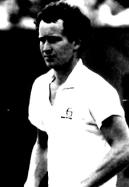
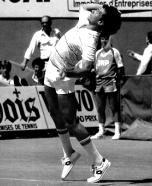

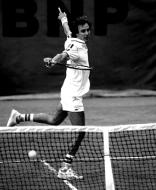

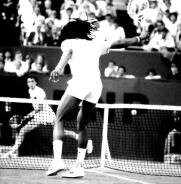
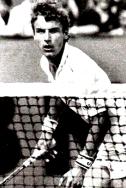
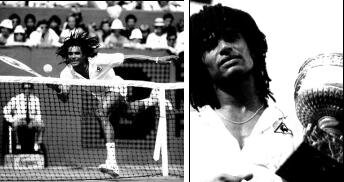
Matches on YT:
1982
Wilander vs. Gerulaitis
very short clips:
Forget vs. Nastase
Noah vs. Fibak
Connors vs. Forget
Wilander vs. Clerc (famous point)
Wilander vs. Vilas
1983
Wilander vs. McEnroe
Noah vs. Wilander